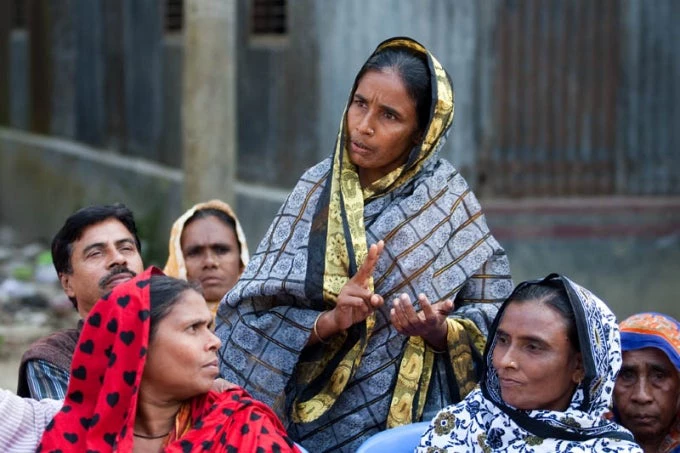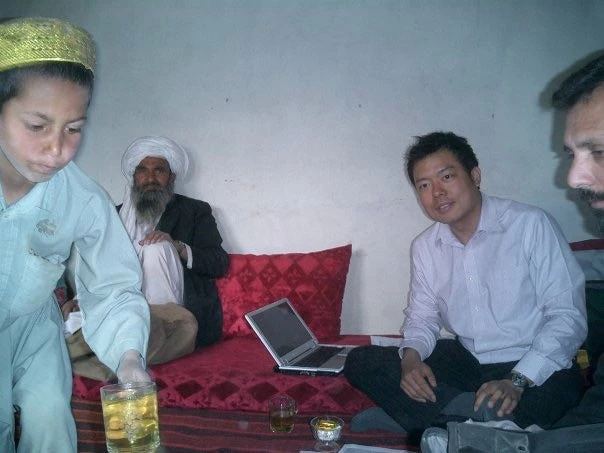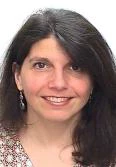
Sitting cross-legged under a mango tree’s shade in the middle of a village in Rajshahi district, Bangladesh, I joined my colleagues and about ten women who were participating in a focus group discussion.
The fieldwork marked the beginning of our in-depth research on gaps and constraints to women’s economic empowerment in Bangladesh for the just-released World Bank report, Voices to Choices: Bangladesh’s Journey in Women’s Economic Empowerment.
My focus is gender equality in household asset ownership—a crucial element for women’s economic empowerment—and one of the four pillars of the World Bank Group Gender Strategy 2016-2023. Assets generate income, facilitate access to capital and credit, strengthen individual and households’ ability to cope with economic shocks, and serve as a store of wealth.
We asked the women in the group if they owned any assets and a common response we received was along the lines of, “People here are poor. We have no land. Women have earrings, nose pins or small necklaces.
No women own any land in their name.” Similarly, Voices to Choices finds from analysis of quantitative data that far fewer women than men own agricultural land in Bangladesh.
Among rural households that own agricultural land, only 13 percent of women have sole or joint ownership of agricultural land, compared to 70 percent of men.
As a few women picked up their dupattas to wipe beads of sweat off their foreheads, I pressed our facilitator, Shameem, to dig deeper and uncover more about their economic rights and inheritance. He asked the participants if they had received any assets from their parents, and almost all of them said yes. Nazneen, a 30-year-old mother of two, shared her story: When she got married, her husband had no productive assets, including land for farming. She used funds from her father and bought a piece of land for her husband.
When asked why she did not register the land under her name, Nazneen responded that the community would not like it and would query, “Why does a woman need to own assets?” Nazneen also thought that if the land was registered in her name, the community would not honor her husband, and her family would be the subject of gossip. In her case, when the land was registered in her husband’s name, they were making joint decisions about buying and selling land.
In fact, Voices to Choices finds that economic rights over assets are also essential to women’s economic empowerment, as they may provide at least part of the control of assets that ownership provides. Norms often prevent women from directly owning agricultural land; it is more permissible for women to have just some of these rights. As a result, gender gaps in rights over assets are narrower than gaps in ownership.
A random breeze cooled us down, bringing the all-too-familiar smell of the ongoing mango season. The group agreed that wealth empowers women in other aspects of life. Women in the focus group who earn income tended to present themselves differently, spoke more convincingly, and were valued by others. Nazneen’s husband accepted her opinions because of her wealth.
Selima’s story, on the other hand, underscores the vulnerability of women’s asset ownership. Voices to Choices finds that as a woman often acquires use of land rights through her relationship to a man – usually a husband or a father – those rights are subject to continuation of that relationship. Changes in relationship status can jeopardize women’s rights over property and other assets. Selima’s husband sold all of his assets, went to Dhaka, and married a second wife. She now has no contact with him and has never received any child support.
What can be done?
The government of Bangladesh has introduced several policies to address gender gaps in asset ownership. The National Women Development Policy 2011 aims to establish gender equality in all spheres of life, including “the rights to wealth and resources earned through income, succession, loan/credit, land and market management.”
Prime Minister Sheikh Hasina recently called for the protection of women’s property rights, specifically calling for the words “son” and “daughter” in the laws to be replaced with the word “child,” so that regardless of child’s gender, they acquire their fair share of parents’ property.
To help reach this goal, Voices to Choices – funded by the World Bank Group’s Umbrella Facility for Gender Equality and Australia’s DFAT – recommends several good practices to reduce gender gaps in asset ownership, based on initiatives by the Bangladesh government and NGOs as well as international experience, such as:
- Engage with religious leaders: Although the Constitution’s provision on inheritance is gender-equal and Muslim personal law strongly supports women’s property rights through inheritance, knowledge of such laws is lacking. Engaging religious leaders to educate the public and advocate for women’s inheritance rights is an effective approach to raising awareness.
- Engage men and communities to change gender norms: Programs that aim to change gender norms need to involve not only women but also men and community leaders. BRAC’s Gender Quality Action Learning (GQAL) has been quite impactful, in part because it has used these inclusive approaches.
- Modify laws to protect marital property: Reforms promoting joint ownership of property can ensure that married women have a legal claim to property along with their husbands . The government of Bangladesh’s efforts to distribute khas (public) land have enabled registration of publicly distributed land in both the husband’s and wife’s names.
- Fill knowledge and data gaps: Measuring asset ownership at the individual level (ownership by individuals), rather than at the household level, improves understanding of the state of women’s empowerment and well-being within the household.



Join the Conversation